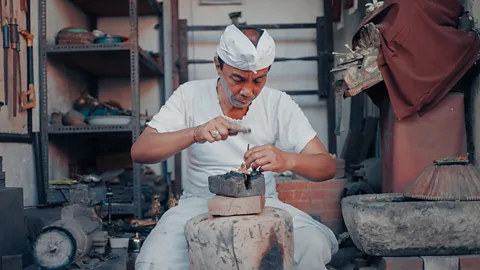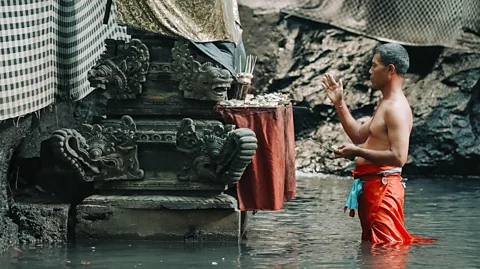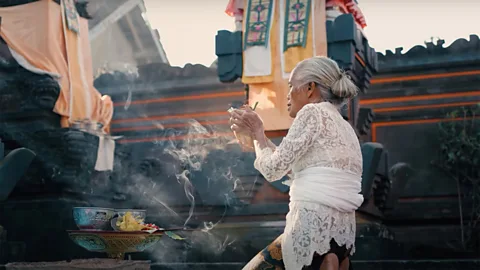By Claire Turrell, Features correspondent
 Quantum Temple
Quantum TempleWith its tourism industry hit hard by the Covid-19 pandemic, Indonesia has decided to protect its future by placing its cultural heritage on Web3.
Sparks from the fire filled the air as a descendant of a clan of 15th-Century blacksmiths plunged a pair of tongs holding an alloy of precious metals into the flames. At his forge, in the Balinese village of Klungkung, Jro Mangku I Wayan Sudiarta appeared serene as he carved sacred symbols into the temple bell. It had taken the blacksmith-turned-priest 70 hours to create the bell, which was moulded with black volcanic soil and formed from gold, silver, copper, zinc and iron. But it was worth the wait. For when it is rung, the temple bell is said to create the sound that contains all sounds. It brings health, prosperity and peace and marks beginnings and endings.
Sudiarta is one of the few remaining blacksmiths in Bali who is able to create this sacred bell by hand. However, his legacy is not only protected by his craftsmanship, but the fact he is now one of 11 artisans from Indonesia who are helping to protect the country’s past and future by placing their work on Web3, a new iteration of the web that includes blockchain technologies.
The artisans have joined with Quantum Temple, a Web3 platform designed to preserve cultural heritage, and Indonesia’s Ministry of Tourism to create Paths to Alangö, a collection of NFTs, one-of-a-kind digital assets that are sold through Web3.
“We saw this as not just [a way to] to conserve the culture, but also succeed [in the future],” said Muhammad Neil El Himam, Deputy of Indonesia’s Ministry of Tourism and Creative Economy.
 Quantum Temple
Quantum TempleBali closed its doors to international tourists in March 2020 when the pandemic struck, only opening seven months later. With 80% of its economy reliant on tourism, the island was hit hard. Quantum Temple founder Linda Adami, who lived in Bali for seven months during the pandemic, saw first-hand the devastating effect the lack of tourists was causing for the local economy. One in three people in Bali lost their jobs, according to the Australian-Indonesian Research team.
Adami had been travelling around the island and discovering the work of different artisans, many of whom had to take to fishing or farming to help feed their families. While she was there, the American digital artist Beeple sold an NFT for $69m at Christie’s. With a background in blockchain, Adami could immediately see how Web3 could connect artisans in Bali to a new audience and give them a way to earn a regenerative income. By offering their works as NFTs, artists will also receive a percentage of any secondary sales.
Adami met with local communities and the tourism board and mooted the idea of local artisans creating an NFT collection. To guarantee authenticity, she also invited anthropologist Steve Lansing to curate the works. Lansing, who worked on Bali’s Unesco nomination for its rice terraces, believes this sustainable tourism project could make more of an impact to protect Bali’s heritage than the successful Unesco bid.
“What this blockchain project does is provide a source of income and recognition. That’s a wonderful thing and it was absent from the Unesco programme,” said Lansing.
 Quantum Temple
Quantum TempleThe Paths to Alangö NFTs comprise Cultural Heritage NFTs, which capture intangible works such as dances; Cultural Artefact NFTs, which include tangible works like the temple bell; and Cultural Experiences NFTs, which gives the NFT owner an all-access pass to real-life cultural experiences filled with rituals and tradition. Depending on the NFT, each will be sold as one of one, or in larger amounts, but still limited edition.
Travellers who purchase the NFT will be able to view the experience on the NFT video before they go there in real life, and they can also connect with villagers before they arrive. Indonesia will be able to restrict the amount of tourists visiting small villages as the NFTs are sold in limited amounts, so the travel experience will be one that helps rather than hinders the community. And if that’s not enough, the NFT will also provide a keepsake when the traveller returns home.
“We are promoting conscious travel and cultural preservation and we hope that these NFTs can connect the would-be traveller with the local communities before they come to Indonesia,” said Himam.
To ensure authenticity for each NFT, rituals can be filmed when the Balinese calendar allows. One such NFT is Galungan, a festival that falls on the 11th week of the uku calendar when the spirits of the ancestors return home. Adami and the team travelled to the 19th-Century village of Penglipuran in South Bali to film villagers taking part in this ceremony that dates to the times of the Majapahit empire (1293-1527). The NFT will give its new owner an insight into this 10-day festival of prayer, feasts and offerings through the NFT video and then with a real-life experience. The closest some other travellers may get to this festival in real life is seeing the 10m-tall, curved bamboo poles festooned with offerings used to mark the entrance of every home, as they won’t have access to the locals who could lead them.
 Quantum Temple
Quantum Temple“This is not a movie set in any way, this is a process of preservation and archival, so we really want to showcase the essence of what these traditions is as if you were there,” said Adami.
While NFTs undoubtedly took a serious hit due to the drop in cryptocurrency in 2022, the medium wasn’t short of star sales that year. The NFT artwork CyptoPunk #5588 sold for $23.7m. Indonesia hopes to have at least a small piece of the large amount of money that NFTs attract. The artists on the Paths to Alangö project will receive 40% of the original sale, and 4.5% from future secondary sales. A portion of the original sale will also go to a social impact fund for sustainable projects in Indonesia.
The first sale, which was on 22 March 2023, showed positive signs for the initiative, with the NFT of a Balinese dance selling for Eth53.59 ($96,989.86). The choreographer of the Royal Topeng NFT, I Made Bandem was blown away by the response. Not only was he delighted in the amount raised, but his aim for this NFT is to attract the next generation of traditional dancers. The owner of the NFT will not only own this video, but will be able to see I Made Bandem perform the dance in Bali.
Meanwhile, Gen Z dancers Kadek Dwi Martini and Ni Kadek Virna Erikayani, who performed a dance from the 1920s called the Cendrawasih (Birds of Paradise), are using the NFT to raise funds for The Art House in Sebali Village that preserves and develops traditional Balinese culture. The dancers, who were filmed on one of the country’s black volcanic beaches and the Unesco World Heritage site of Tegalalang Rice Terrace in Bali, are sharply aware that if they don’t act, they might be one of the few that specialise in this traditional dance in the future.
Dwi, a student from Ubud, said: “We do have concerns about this. But we hope that people will see this NFT, and it will inspire the younger generation [that it can be a thriving way of life].”
 Quantum Temple
Quantum TempleThe Paths to Alangö wants to show that these ancient traditions can still provide an income. Sudiarta has seen other blacksmiths find new occupations because their renumeration was insufficient. Now artisans will not only be introduced to more potential buyers, but as each NFT sold is a commission, they will have the security of receiving the money to make the artwork before they start. This elevates the artistry, Adami said, as the fear they will be left with stock means that some artisans resort to creating lower-quality items.
Lansing said this level of artistry needs to be recognised. “It elevates their creations to something that needs a curator,” said Lansing. “These are not just handicrafts; these are classical arts.”
While Quantum Temple plans to expand to Peru and Panama in 2023, the NFT sustainable travel experiences for Indonesia will also increase. “It will be like a portal, but a carefully structured mode of access,” said Lansing. “You can feel good about becoming involved because it’s being held by the hand and guided.”
While some of the collection’s NFTs have already been auctioned and others are yet to be released, the NFTs are already helping to renew the spirit of the villagers taking part. When the project soft-launched in February 2023 at the 10th-Century water temple of Pura Tirta Empul in Bali, locals performed dances within its historic walls. Adani said the Indonesians working on the project could already see it giving a boost to the community.
“Everyone said they wanted to reintegrate performing arts at the temple in a more recurring way because it really brought the community together and made the temple so alive,” said Adani.
Future of Travel is a series from BBC Travel that investigates what the world might look like to travellers in the coming years and meets the people living on the frontlines of change.


